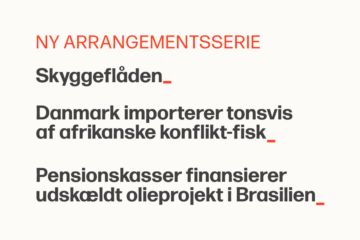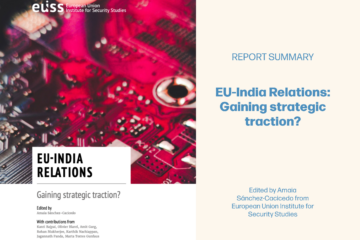Russian ambassador Barbin on the Western-Russian relations
SPEECH: Russia stands as a ‘power balancer’, an alternative for states who do not want to align either with the US or China. That is how Ambassador of the Russian Federation to Denmark, H.E. Vladimir Barbin sees the new world order. Read his speech at CPH Conference on Western-Russian Relations the 21st of November 2020.
By H.E. ambassador Vladimir Barbin
The underlying idea of modern world politics is the struggle for a new world order. The previous two-bloc system has already vanished. The “unipolar” world is disappearing. The fastest and the most dramatic redistribution of power ever between the old leaders (mostly in the West) and new leaders (mostly in Asia) will continue.
A possible exception to the downward trend is the U.S., which will remain a superpower for at least several more decades. But the U.S., too, is losing the ability to dictate its will to other countries and determine the development of the world economy and politics as a whole.
The fundamental cause of this shift is the end of the West’s almost five-hundred-year-long military superiority, which was the basis of its political, economic, ideological and cultural domination in the world. Amid the immensely increased mutual interdependence, the world is going back to the traditional polycentricity and multilateralism.
The democratization of international relations will continue. People in the medium-sized and even small countries claim a political role of their own, urging their elites to act more independently. Major regional players refuse to follow in the footsteps of great powers and their participation becomes vitally important for resolving key international conflicts and problems (the Middle East is a clear proof).
Most of the international regulation and cooperation institutions are becoming weaker or being purposefully destroyed.
The speed of change and the fierceness of competition prod global and regional powers into acting without rules.
This is one of the main reasons, why the importance of military force keeps growing in international relations.
When Russia de facto gave up the policy of active deterrence, the West immediately committed series of aggressive acts against Yugoslavia, Iraq and Libya.
The global economic project created by the United States after World War II is falling apart. Globalization has been partly reversed. The world economy is being fragmented, regionalized and, above all, politicized.
All this is happening despite a slightly shrinking but still unprecedentedly high level of economic interdependence.
Under these circumstances, economic interdependence for many countries is increasingly turning from a predominantly positive factor into a factor of vulnerability. This is also a new reality in the relationships between Russia and the West.
Two geo-economic and geopolitical centers – China plus and the U.S. plus – are emerging. The U.S. is pushing the world towards a new bloc polarization, thus seeking to restore its leadership by imposing confrontation, and weakening those who disagree with its hegemony.
China, for its part, is pushing increasingly confident and globally oriented policies, offering, inter alia, the Belt and Road Initiative. It is also worth mentioning that China – opposite to the U.S. – has never made any claims to world leadership.
An advantage of Russia’s foreign policy is its pragmatic nature. Many countries in Asia, Middle East, Africa and Latin America are drawn to Russia largely because they do not want to make a choice between two superpowers of the first half of the 21st century – the United States and China – and view Russia as a “power balancer”.
Russia is seen as an alternative that is not strong enough to dominate itself, but strong enough to allow many countries to avoid the domination of others.
The European Union has apparently missed the opportunity to become (jointly with Russia) the third pillar of a new world order and will be getting down. I would like to recall that the EU had a chance in early 90’s of the previous century to realize a new big idea – a space of security and cooperation from Lisbon to Vladivostok, combining Europe`s technology and finance with Russia’s resources, human capital and strategic power. But the European Union rejected this project.
Relationships between Russia and EU are at the lowest level today. A couple of months ago President of the European Commission Ursula von der Leyen stressed how important it was to shed the illusions that Russia under current government will be able to regain the status of the EU’s geopolitical partner. Russia wants to understand whether there could be any business at all with the European Union.
The reputation of the West as a reliable partner for Russia has immensely suffered when the major Western countries on behalf of the European Union acted in Ukraine in 2014 as a collective peace broker and as guarantors of the deal between the opposition and President Janukovitch.
However, they did absolutely nothing when Janukovitch was toppled from power the next day after signing the deal.
It is difficult for Russia to believe that the latest developments in Belorussia do not have a geopolitical dimension, especially when the West once again is trying to play an active role in the domestic affairs of this sovereign country. The presidential elections there were not ideal. Nevertheless, the initiated constitutional reform in Belorussia could provide a platform for a dialogue embracing the entire Belorussian society. Russia is not intervening in the domestic affairs of Belorussia and is calling up the West not doing it either.
The international environment will continue to be re-ideologized. With international communism and ultranationalism (fascism) gone, religions weakening, especially in the Western world, and global influence of liberal democracy increasingly declining an ideological vacuum is emerging. A struggle for filling it is beginning.
Against this background, the West is waging a political and information war against its economic and political competitors, inter alia Russia, trying to discredit them by using the remaining information advantages. The struggle for control in the sphere of ideas is growing increasingly fierce in front of our eyes.
The threat of major international conflicts and their escalation is growing and likely to increase further in the near future.
Arms limitation and control regimes and even channels of interaction between military-political leadership of major countries are falling apart.
Mistrust and strategic uncertainty are increasing. Political hostility is growing.
Under these circumstances, a comprehensive dialogue between Russia and the West aimed at their possible joint measures to prevent the further degradation of the military-political situation is needed.
NATO confirms its interest in a dialogue with Russia but not in the resumption of an interaction on arms control, confidence and security building measures in Europe.
Earlier this year Russia made a proposal to NATO to follow a policy of mutual military restraint during the pandemic of the coronavirus and, inter alia, to abstain from military exercises near the line of contact between Russia and NATO but it was ignored.
Just recently, Russia has reiterated its commitment to the moratorium earlier declared by the President of the Russian Federation on the deployment of ground-based intermediate- and shorter-range missiles until US-manufactured missiles of similar classes appear in the European area.
Our call to NATO countries to consider the possibility of declaring a reciprocal moratorium remains relevant.
In 2020 the strategic dialogue between Russia and the U.S., suspended by the US side under President Barack Obama, was finally resumed. Russia and the U.S. have different and somewhat conflicting approaches to the very subject of the dialogue.
The U.S. approach is based on two major elements. The first one – putting a “cap” on the entire stock of nuclear warheads Russia and the U.S. currently possess, and a short-term extension – for one year – of the Strategic Arms Reduction Treaty (START Treaty).
Another basic requirement of the U.S. is bringing China to the table of negotiations. However, the U.S. is not inviting its nuclear allies – the Great Britain and France – to join a new possible strategic deal.
The idea of putting a “cap” on all nuclear warheads may sound great, and the word “extension” is present. So, what is the problem?
First of all, the American proposal equals to lifting all restrictions on delivery vehicles, launchers and platforms, inter alia submarines and heavy bombers. If this concept is adopted, all these assets become totally uncountable and uncontrollable.
Russia has proposed a framework that is much more ambitious. Its idea is to jointly develop a new strategic “equation”, taking into account all factors affecting strategic stability as well as emerging new kinds of weapons and prospective technologies.
We want it to include not only traditional strategic arms such as ICBMs, SLBMs and heavy bombers but also all nuclear and non-nuclear weapons that are capable of accomplishing strategic tasks, with particular attention to means usable for launching a first strike to neutralize or weaken the deterrence potential of the other side.
But Americans insist on their concept of “freeze only”. Under such circumstances we have made a special effort and proposed the final bid: Russia has agreed to a one-year freeze on nuclear warheads and a one-year extension of the START, provided there are no preconditions for that from the U.S. side.
The year that we would gain should be used for comprehensive bilateral negotiations on the future of controlling nuclear and missile weapons with mandatory assessment of all factors affecting strategic stability.
Due to the presidential elections in the U.S. the bilateral dialogue on strategic matters, including the extension of the START, is put on hold now.
It is essential to move the world away from the dangerous path of the latest developments. Many expectations are connected now with the summit of the permanent members of the U.N. Security Council proposed by Russia. This idea is well received but summit preliminary planned for September 2020 in New York has been postponed due to the coronavirus epidemic.
I would like to conclude my speech by saying that the responsibility for preventing the further deterioration of the international relations is not lying only on the shoulders of superpowers. But unfortunately, we could hardly notice today any attempt from the West small and medium-sized countries to facilitate a comprehensive dialogue on key security policy issues at a global and regional levels.
Thank you for attention.


